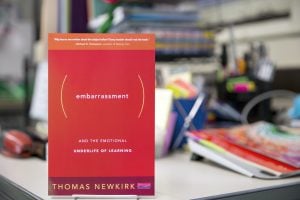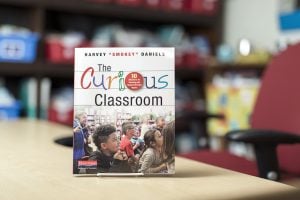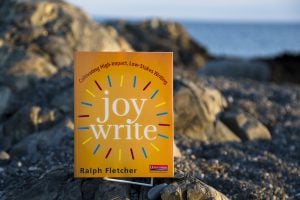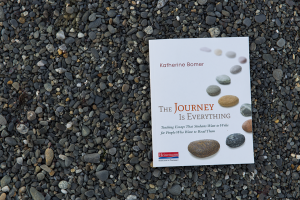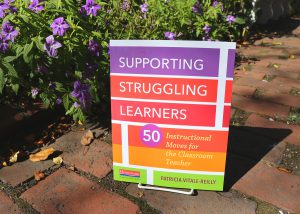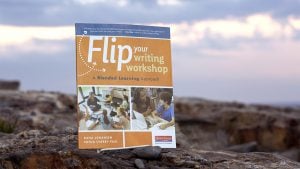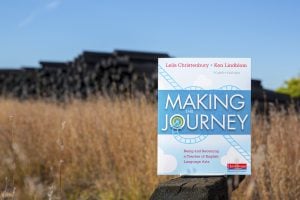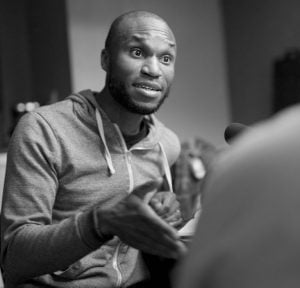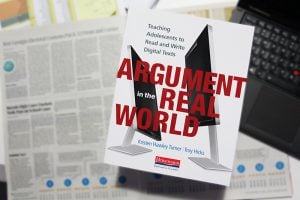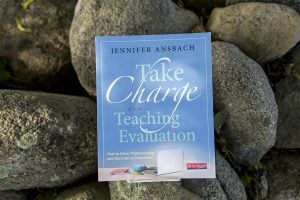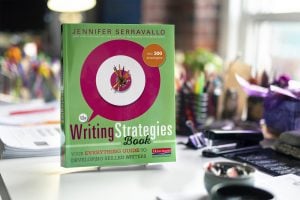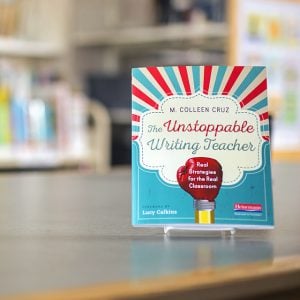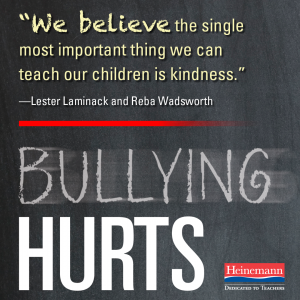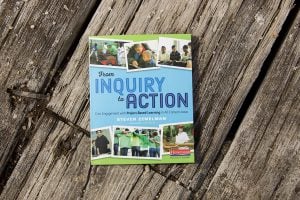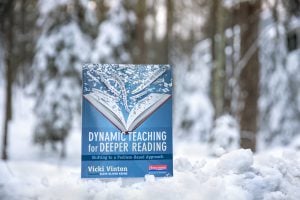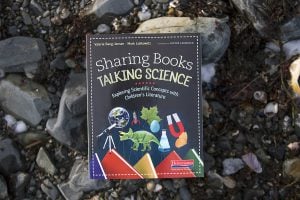
Overwhelmed by the sheer number of inspiring Heinemann authors who attended this year's National Council of Teachers of English conference? So are we-- in the best way. Whether you were able to attend the conference or not, below we've compiled some of our favorite Heinemann podcasts with authors who presented at this year's NCTE so you can listen from anywhere to learn more. Enjoy!
Tom Newkirk on his newest book, Embarrassment:
We’ve all been there. In the dead of night, lying awake, replaying that one moment over and over again in our minds. The daily mistakes we make, both large and small, are part of what make us human, and yet, are often impossible to forgive ourselves for. In his new book, Embarrassment, Tom Newkirk writes, "We perform for ourselves, often the harshest of audiences.” But how does embarrassment affect our professional lives as teachers, and how does it affect students?
Ellin Keene reflects on the 20th Anniversary of Mosaic of Thought with Tom Newkirk:
Mosaic of Thought, by Ellin Keene and Susan Zimmermann, became a runaway best-seller as the first book to explicitly describe the use and benefits of strategy-based comprehension instruction. To recognize the 20th anniversary of the book, Tom Newkirk, who served as editor, recently sat down with Ellin Keene to revisit how Mosaic of Thought came to be and the impact it had on education.
Listen to Ellin Keene with Tom Newkirk on The Heinemann Podcast here.
Harvey "Smokey" Daniels on The Curious Classroom:
What happens when we put our students in the driver’s seat? Harvey “Smokey” Daniels says that when we let kids be curious, they dive deep. They persist longer when they’re curious and if we can activate a student’s curiosity, they no longer need to be forced into action. So where do elementary teachers fit inquiry and curiosity into their day? How do teachers harness the power of curiosity? And how do we hand over the reins to students in a well-structured environment?
Ralph Fletcher discusses his book, Joy Write:
According to Ralph, nothing helps writers grow like practice, but not just any kind of practice will do, you’ve got to bring the joy! In his new book, Joy Write, Ralph shares the whys and the how of giving students time and autonomy for the playful, low-stakes writing that leads to surprising, high-level growth.
Katherine Bomer on The Journey Is Everything:
What comes to mind when you think about the traditional 5-paragraph essay? Do you cringe? Sadly, many students only know “essay” as a 5-paragraph, tightly structured writing assignment that must check all the boxes of a standardized formula. How did essays in school get so far away from essays in the world? In her newest book, The Journey is Everything, Katherine Bomer makes a case for the benefits of authentic essay writing that breaks free of the 5-paragraph formula used in most middle and high school English classes.
Patricia Vitale-Reilly on Supporting Struggling Learners:
How do we meet the needs of all our students while also meeting the demands of the curriculum? Every learner has strengths, writes Patricia Vitale-Reilly. She goes on to say, upon those strengths is where growth can occur. In her new book, Supporting Struggling Learners, Patty outlines 50 instructional moves for the classroom teacher. These moves that can be applied across subjects and grades. Patty walks us through how to make a positive impact on student thinking and learning.
Listen to Patricia Vitale-Reilly on The Heinemann Podcast here.
Dana Johansen and Sonja Cherry-Paul on their book, Flip Your Writing Workshop:
How many times during a writing workshop have you thought, “If only I could clone myself!” Well, authors Dana Johansen and Sonja Cherry-Paul have a solution for more one-on-one teaching time during your writing workshop: flipped learning. In their new book: Flip Your Writing Workshop, they explain how a blended learning approach allows students access to instruction and support when they need it, as often as they need it.
Listen to Dana Johansen and Sonja Cherry-Paul on The Heinemann Podcast here.
Leila Christenbury and Ken Lindblom on Making the Journey:
It’s not often your favorite author asks you to co-write their next book, but that’s exactly what happened to Ken Lindblom when he met Leila Christenbury at a NCTE lunch a couple of years ago. Ken was telling Leila how influential her book, Making the Journey, had been to him as he started his teaching career and then to his education students. Leila suggested that with the right partner a new edition might be possible and from there, the duo teamed up.
Listen to Leila Christenbury and Ken Lindblom on The Heinemann Podcast here.
Cornelius Minor on his experience with the Over-engaged Student:
When we think about engagement we almost immediately focus on the student who won’t talk or just doesn't engage. But what about the student who is over engaged? In this podcast, we’re continuing our series of conversations with Cornelius Minor. Here we’re talking about a student he has nicknamed “Prez” short for president of the class. Listen in!
Kristen Hawley Turner and Troy Hicks discuss their book, Argument in the Real World:
Every day, our students are inundated by information—as well as opinions and misinformation—on their devices. These digital texts influence them. In Argument in the Real World, Kristen and Troy share a wealth of insights and practical strategies for teaching students the logic of argument. Wherever arguments are streaming in through – Snapchat, viral videos, internet memes, or links to other blogs or websites, Kristen and Troy guide us on how to engage with and create digital arguments.
Listen to Kristen Hawley Turner and Troy Hicks on The Heinemann Podcast here.
Jennifer Ansbach on her book, Take Charge of Your Teaching Evaluation:
Evaluations can feel like a one-way street, with teachers feeling powerless. It doesn't have to be that way, Author Jennifer Ansbach writes about how we can take charge of evaluations by keeping the focus on student learning. In her new book, Take Charge of your Teaching Evaluation, she writes about the story of your practice. We started out asking her what she means by that and why our story of practice is so important?
Linda Rief discusses Read Write Teach:
Linda Rief is always teaching. She has inspired thousands to lead students on a journey to becoming lifelong readers and writers. In her book Read Write Teach, Linda offers the what, how, and why of a year’s worth of reading and writing for middle and high school students with a comprehensive and flexible framework. The title, Read Write Teach means a lot to Linda. She says it reflects how much her students teach her every day.
Jennifer Serravallo discusses her approach to The Writing Strategies Book:
On this edition of the Heinemann Podcast, The Writing Strategies Book author, Jennifer Serravallo. In 2015, The Reading Strategies Book made the New York Times Best Seller List by making it simpler to match students’ needs to high-quality instruction. Now, in The Writing Strategies Book, Jen Serravallo does the same, collecting 300 of the most effective strategies to share with writers, and grouping them beneath 10 crucial goals. When we sat down to talk a few weeks ago, I wanted to know how Jen approached the organization of The Writing Strategies Book.
Listen to Jennifer Serravallo on The Heinemann Podcast here.
Colleen Cruz on The Unstoppable Writing Teacher:
“As a profession, we are gripped by fear.” Those are the opening words from Lucy Calkins in her forward to The Unstoppable Writing Teacher by Colleen Cruz. As Lucy prepares the reader for Colleen’s words, she goes on to write:
“(Fear) is a cage that traps us, alone, into our worst selves. Into a space with demons only we can see. We become the person we dread being.”
In The Unstoppable Writing Teacher, Colleen Cruz tells us to name that fear. As a self-declared positive pessimist, Colleen guides us through building a better toolbox and helps us identify what stops us in writing instruction.
Sara Ahmed with Sonja Cherry-Paul and Cornelius Minor on Dismantling Racism in Education:
Not talking about racism is not a solution. How do we have this conversation and how do we unravel assumptions about racism? Even if you don’t have the expertise we can create safe space for the conversation. How do we get started and move forward? How can these talks bring us together? We sat down to talk about what racism looks like and how do we breakup the assumptions we make about racism.
Listen to Sara Ahmed, Sonja Cherry-Paul and Cornelius Minor on The Heinemann Podcast here.
Lester Laminack on Bullying Hurts:
While Bullying Awareness month may be over, the need certainly is still with us. In this podcast we continue our conversation on the resource, Bullying Hurts. In part 2 of our conversation, co-author Lester Laminack says that the term bullying is in danger of being overused which could cause it to lose its effectiveness. He says there’s a difference between a student who is being rude and bullying. We started our conversation on the need to work towards kindness not only in our classrooms, but in the world.
Steve Zemelman on From Inquiry to Action:
What really matters to your students? They might say the issues in front of them at school and in life. When students inquire into those issues and they’re given an opportunity for their arguments to be read by the city council or published in the local newspaper, they’re eager to research and find relevant information in nonfiction texts to bolster their claims. They become committed to writing, revising, editing and correcting their grammar. They want to think broadly about what reasoning will be effective with their audience. Whether you teach English, social studies, science, or math.
Vicki Vinton on Dynamic Teaching for Deeper Reading:
In this edition of the podcast: problem-based teaching. How do we prepare students for a world that’s changing so rapidly that a majority of those sitting in classrooms today will go on to hold jobs that don’t yet exist, using technologies that haven’t yet been invented to solve problems we don’t even know are problems yet? Author Vicki Vinton, says the answer is to help build students’ capacities as critical and creative thinkers by shifting to a problem-based approach for teaching reading. In her new book, Dynamic Teaching for Deeper Reading, Vicki connects the practices in the book to all sorts of current thinking and trends.
Sharing Books, Talking Science with Valerie Bang-Jensen and Mark Lubkowitz:
On this podcast — exploring science in children’s literature. Science is everywhere, in everything we do, see, and read. All books offer possibilities for talk about science in the illustrations and the texts… once you know how to look for them. Children’s literature is a natural avenue to explore the seven crosscutting concepts described in the Next Generation Science Standards. In their new book: Sharing Books, Talking Science, authors Valerie Bang-Jensen and Mark Lubkowitz help teachers develop the mindset necessary to think like a scientist, and then help students think, talk, and read like scientists.
Listen to Valerie Bang-Jensen and Mark Lubkowitz on the Heinemann Podcast here.
Kate Roberts and Jess Lifshitz on Supporting LGBTQ Students and Teachers:
On this edition of The Heinemann Podcast, how can teachers improve their practice around LGBTQ needs in the classroom? It’s October 11th, National Coming Out Day. A day for those who identify as LGBTQ to be visible. A day to say you matter, you’re not alone. How can educators make their classrooms a safer place for LGBTQ students and why is it important for both LGBTQ teachers and students to see schools as a safe place? Heinemann author Kate Roberts and Heinemann Fellow Jess Lifshitz talk more about the importance for our classrooms to be safe places.
